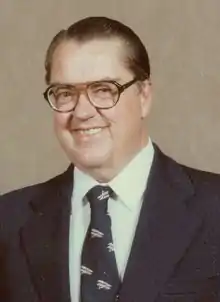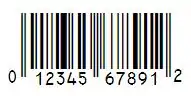George Laurer
George Joseph Laurer III (September 23, 1925 – December 5, 2019) was an American engineer for IBM at Research Triangle Park in North Carolina. He published 20 bulletins, held 28 patents and developed the Universal Product Code (UPC) in the early 1970s. He devised the coding and pattern used for the UPC, based on Joe Woodland's more general idea for barcodes.
George Laurer | |
|---|---|
 | |
| Born | George Joseph Laurer III September 23, 1925 Manhattan, New York City, U.S. |
| Died | December 5, 2019 (aged 94) Wendell, North Carolina, U.S. |
| Alma mater | University of Maryland |
| Notable work | Universal Product Code |
Early life
George Laurer was born on September 23, 1925, in New York City. His family moved to Baltimore, Maryland, so his father, an electrical engineer, could work for the United States Navy.[1] Laurer recovered from polio which he contracted as a teenager,[1] nonetheless, while in 11th grade, he was drafted into the U.S. Army during World War II.[2] After being discharged from the military, he attended technical school where he studied radio and television repair. Upon completion of his first year at the technical school, his instructor convinced him that he should not continue that course of study, but that he should go to college.[3] Laurer graduated from the A. James Clark School of Engineering at the University of Maryland in 1951.[3][4] He was still interested in radio and kept up his amateur radio licence.[2]
Career

Laurer was a 36-year employee of IBM until his retirement in June 1987.[5] He joined IBM in 1951 as a junior engineer.[1] By 1969, he had been promoted to senior engineer / scientist and moved to the company's offices in Research Triangle Park in North Carolina.[1][3]
At IBM, Laurer was assigned the task of developing barcodes for use in grocery stores.[2] Initially, IBM envisioned a circular bullseye pattern as proposed by Joe Woodland in 1940s.[6] Laurer realized that the pattern was ineffective because of smearing during printing. Instead, he designed a vertical pattern of stripes which he proposed to his superior in 1971[6] or 1972.[1] This change was accepted by IBM management and Laurer then worked with Woodland and mathematician David Savir to develop and refine the details.[7] These included the addition of a check digit to provide error correction.[2] In 1973, the IBM proposal was accepted by the Symbol Selection committee of the Uniform Grocery Product Code Council,[2] a consortium of grocery store companies.[3][6]
The Universal Product Code has bit patterns at the beginning, middle and end of the barcode called "guard bars" and these have been interpreted as the digits 666.[8] When he first developed the code, Laurer noticed that the digit 6 appeared several times and that this might be interpreted as the number of the Beast, as his daughter was studying the Book of Revelation.[8] When the codes started to appear in stores, there were protests and an urban legend developed.[8] Laurer addressed this on his website:[9]
- Answer – Yes, they do RESEMBLE the code for a six. An even parity 6 is:
- 1 module wide black bar 1 module wide white space 1 module/ wide black bar 4 module wide white space.
- There is nothing sinister about this nor does it have anything to do with the Bible's "mark of the beast" (The New Testament, The Revelation, Chapter 13, paragraph 18). It is simply a coincidence like the fact that my first, middle, and last name all have 6 letters. There is no connection with an international money code either.
Legacy
Laurer was the holder of 25 patents and authored 27 published Technical Disclosure Bulletins. In 1976, he was given the Raleigh Inventor of the Year Award. In 1980, he received the Corporate Technical Achievement award from IBM.[3][5]
As of 2019, UPC barcodes were being scanned more than 6 billion times each day, according to GS1.[1]
Personal life
Laurer lived in Wendell, North Carolina until his death in December 2019.[10] His wife, Marilyn Slocum Laurer, died in 2013.[1] They had four children.[4]
Published journal articles
- Savir, David; Laurer, George J. (1975). "The characteristics and decodability of the Universal Product Code symbol". IBM Systems Journal. 14 (1): 16–34. doi:10.1147/sj.141.0016.
References
- Smith, Harrison (December 10, 2019). "George Laurer, an inventor of the modern bar code, dies at 94". The Washington Post. Retrieved December 10, 2019.
- Parks, Harold; Musser, Gary; Trimpe, Lynn; Maurer, Vikki; Maurer, Roger (2006). A Mathematical View of Our World. Cengage Learning. ISBN 0495010618. Retrieved May 11, 2018.
- "George J. Laurer". UPC: The Transformation of Retail. IBM. January 25, 2011. Retrieved December 11, 2019.
- "George Laurer, inventor of ubiquitous UPC, dies at 94". AP News. December 9, 2019. Retrieved December 10, 2019.
- "George J. Laurer". A. James Clark School of Engineering. University of Maryland. Retrieved December 11, 2019.
- Kennedy, Pagan (January 4, 2013). "Who Made That Universal Product Code?". The New York Times. ISSN 0362-4331. Retrieved December 11, 2019.
- Chris Stokel-Walker (December 10, 2019), Beep Beep: The History of George Laurer and the Barcode, Medium
- Cade Metz (December 28, 2012), "Why the Bar Code Will Always Be the Mark of the Beast", Wired
- QUESTIONS about the U.P.C. and the New Testament Archived March 6, 2016, at the Wayback Machine
- "UPC inventor, George Laurer, dies at 94 in his North Carolina home". WTVD. December 9, 2019.
External links
- George J. Laurer's personal web site at the Wayback Machine (archived February 9, 2019)
- Innovation Hall of Fame Inductees, Clark School of Engineering, University of Maryland in 1991.
- Alumni UMD Hall Of Fame Members in 2000
- How the barcode changed retailing (2017) BBC